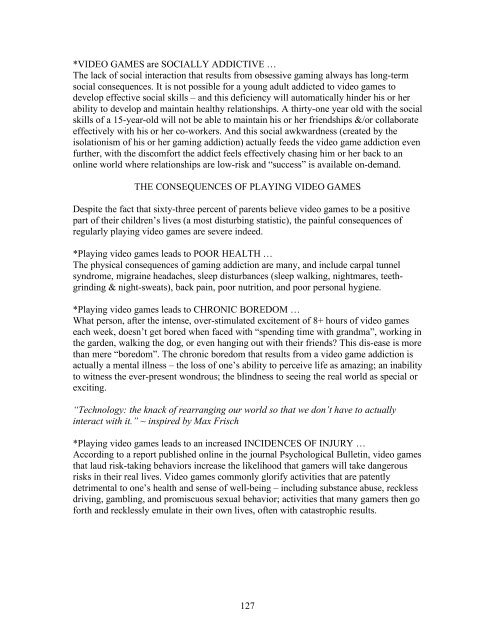Licking the Razor's Edge (2015)
Recognizing the hidden addictions that bind you, … to then set your True Self free
Recognizing the hidden addictions that bind you,
… to then set your True Self free
Create successful ePaper yourself
Turn your PDF publications into a flip-book with our unique Google optimized e-Paper software.
*VIDEO GAMES are SOCIALLY ADDICTIVE …<br />
The lack of social interaction that results from obsessive gaming always has long-term<br />
social consequences. It is not possible for a young adult addicted to video games to<br />
develop effective social skills – and this deficiency will automatically hinder his or her<br />
ability to develop and maintain healthy relationships. A thirty-one year old with <strong>the</strong> social<br />
skills of a 15-year-old will not be able to maintain his or her friendships &/or collaborate<br />
effectively with his or her co-workers. And this social awkwardness (created by <strong>the</strong><br />
isolationism of his or her gaming addiction) actually feeds <strong>the</strong> video game addiction even<br />
fur<strong>the</strong>r, with <strong>the</strong> discomfort <strong>the</strong> addict feels effectively chasing him or her back to an<br />
online world where relationships are low-risk and “success” is available on-demand.<br />
THE CONSEQUENCES OF PLAYING VIDEO GAMES<br />
Despite <strong>the</strong> fact that sixty-three percent of parents believe video games to be a positive<br />
part of <strong>the</strong>ir children’s lives (a most disturbing statistic), <strong>the</strong> painful consequences of<br />
regularly playing video games are severe indeed.<br />
*Playing video games leads to POOR HEALTH …<br />
The physical consequences of gaming addiction are many, and include carpal tunnel<br />
syndrome, migraine headaches, sleep disturbances (sleep walking, nightmares, teethgrinding<br />
& night-sweats), back pain, poor nutrition, and poor personal hygiene.<br />
*Playing video games leads to CHRONIC BOREDOM …<br />
What person, after <strong>the</strong> intense, over-stimulated excitement of 8+ hours of video games<br />
each week, doesn’t get bored when faced with “spending time with grandma”, working in<br />
<strong>the</strong> garden, walking <strong>the</strong> dog, or even hanging out with <strong>the</strong>ir friends? This dis-ease is more<br />
than mere “boredom”. The chronic boredom that results from a video game addiction is<br />
actually a mental illness – <strong>the</strong> loss of one’s ability to perceive life as amazing; an inability<br />
to witness <strong>the</strong> ever-present wondrous; <strong>the</strong> blindness to seeing <strong>the</strong> real world as special or<br />
exciting.<br />
“Technology: <strong>the</strong> knack of rearranging our world so that we don’t have to actually<br />
interact with it.” ~ inspired by Max Frisch<br />
*Playing video games leads to an increased INCIDENCES OF INJURY …<br />
According to a report published online in <strong>the</strong> journal Psychological Bulletin, video games<br />
that laud risk-taking behaviors increase <strong>the</strong> likelihood that gamers will take dangerous<br />
risks in <strong>the</strong>ir real lives. Video games commonly glorify activities that are patently<br />
detrimental to one’s health and sense of well-being – including substance abuse, reckless<br />
driving, gambling, and promiscuous sexual behavior; activities that many gamers <strong>the</strong>n go<br />
forth and recklessly emulate in <strong>the</strong>ir own lives, often with catastrophic results.<br />
127


















